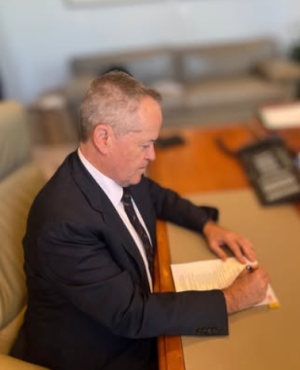Bill Shorten’s shock exit: what it means for Australia’s political future
By
Maan
- Replies 20
Leadership changes in politics often bring uncertainty, sparking questions about the direction of government and the impact on upcoming elections.
A recent announcement has sent ripples through the political landscape, leaving both allies and opponents scrambling to adjust.
What unfolds next could reshape the balance of power and set the tone for what lies ahead.
Bill Shorten, the former Labor leader and NDIS minister, announced he would leave politics next week, prompting a cabinet reshuffle.
The decision came as the federal government prepared for an election, which must be called by 17 May.
Shorten’s departure after nearly two decades in federal politics provided Prime Minister Anthony Albanese with an opportunity to reorganise his ministry ahead of the polls.
Shorten had already confirmed last September that he would not run in the next election, stating his intention to focus on ensuring NDIS reforms were implemented during his remaining time as minister.
His exit, however, came more than a week earlier than initially planned, allowing him to transition into his new role as vice-chancellor of the University of Canberra in February.
The Labor government was expected to navigate voter disillusionment, with polls indicating a potential rise in support for independents in the upcoming election.
Election analyst Ben Raue noted that neither Labor nor the coalition appeared likely to form a majority government, potentially leaving independents in a challenging position.
‘They need to win over some traditional Liberal voters to win their seat, but they also need a lot of Labor and Greens voters,’ Raue said.
The so-called ‘teal’ independents, who gained their seats from the coalition by advocating for climate action and political integrity, would have to manage the competing demands of their diverse voter bases.
Historical precedent, such as the 2010 hung parliament, suggested that independents aligning with a major party could face political backlash.
If they learned from the experiences of MPs Tony Windsor and Rob Oakeshott, who lost support after siding with Labor, the teals might choose to avoid formal deals with either major party.
The Greens also stood to play a pivotal role in the event of a hung parliament, as polls indicated growing support for the minor party.
However, their broader appeal in suburban areas might dilute their performance in traditional strongholds, according to Raue.
Adam Bandt, leader of the Greens, stated that if his party gained influence, it would advocate for progressive reforms such as expanding dental coverage under Medicare.
Despite the potential for a minority government, Albanese ruled out working with the Greens during a second term, though his experience in the Gillard government demonstrated his ability to negotiate policy in such circumstances.
University of Tasmania public policy associate professor Kate Crowley said Labor’s previous minority government was ‘enormously productive’ in passing legislation.
Campaigning in Tasmania alongside candidates for Bass, Braddon, and Lyons, Albanese assured voters that his government would ‘build Australia’s future’.
Opposition leader Peter Dutton took his campaign to regional Victoria, visiting bushfire-affected areas in the Grampians.

Will this decision shape a new chapter in Australian politics, or will it deepen existing uncertainties? Share your thoughts in the comments below.
A recent announcement has sent ripples through the political landscape, leaving both allies and opponents scrambling to adjust.
What unfolds next could reshape the balance of power and set the tone for what lies ahead.
Bill Shorten, the former Labor leader and NDIS minister, announced he would leave politics next week, prompting a cabinet reshuffle.
The decision came as the federal government prepared for an election, which must be called by 17 May.
Shorten’s departure after nearly two decades in federal politics provided Prime Minister Anthony Albanese with an opportunity to reorganise his ministry ahead of the polls.
Shorten had already confirmed last September that he would not run in the next election, stating his intention to focus on ensuring NDIS reforms were implemented during his remaining time as minister.
His exit, however, came more than a week earlier than initially planned, allowing him to transition into his new role as vice-chancellor of the University of Canberra in February.
The Labor government was expected to navigate voter disillusionment, with polls indicating a potential rise in support for independents in the upcoming election.
Election analyst Ben Raue noted that neither Labor nor the coalition appeared likely to form a majority government, potentially leaving independents in a challenging position.
‘They need to win over some traditional Liberal voters to win their seat, but they also need a lot of Labor and Greens voters,’ Raue said.
The so-called ‘teal’ independents, who gained their seats from the coalition by advocating for climate action and political integrity, would have to manage the competing demands of their diverse voter bases.
Historical precedent, such as the 2010 hung parliament, suggested that independents aligning with a major party could face political backlash.
If they learned from the experiences of MPs Tony Windsor and Rob Oakeshott, who lost support after siding with Labor, the teals might choose to avoid formal deals with either major party.
The Greens also stood to play a pivotal role in the event of a hung parliament, as polls indicated growing support for the minor party.
However, their broader appeal in suburban areas might dilute their performance in traditional strongholds, according to Raue.
Adam Bandt, leader of the Greens, stated that if his party gained influence, it would advocate for progressive reforms such as expanding dental coverage under Medicare.
Despite the potential for a minority government, Albanese ruled out working with the Greens during a second term, though his experience in the Gillard government demonstrated his ability to negotiate policy in such circumstances.
University of Tasmania public policy associate professor Kate Crowley said Labor’s previous minority government was ‘enormously productive’ in passing legislation.
Campaigning in Tasmania alongside candidates for Bass, Braddon, and Lyons, Albanese assured voters that his government would ‘build Australia’s future’.
Opposition leader Peter Dutton took his campaign to regional Victoria, visiting bushfire-affected areas in the Grampians.
Key Takeaways
- Bill Shorten announced an early departure, prompting leadership changes.
- The decision has sparked speculation about its impact on upcoming elections.
- Both major parties and independents may need to adapt to the shifting political landscape.
- The move raises questions about how it will influence government priorities and policies.
Will this decision shape a new chapter in Australian politics, or will it deepen existing uncertainties? Share your thoughts in the comments below.
Last edited:









